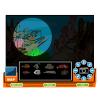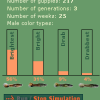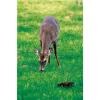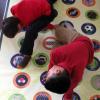Search Results
Showing results 1 to 20 of 23

Underwater ROV
Source Institutions
In this online Flash game, learners will explore a coral reef using an underwater remotely operated vehicle (ROV).

Flashy Fish
Source Institutions
Professor John Endler traveled to Trinidad in the 1970s to study wild guppies. In this activity, learners take part in an online simulation of Endler's work.

Extinct!: Are You Smarter than a Plant?
Source Institutions
In this online activity, learners find out whether they are smart enough to survive as a plant.

Building Bingo
Source Institutions
In this on site "field trip" activity (located on pages 6-9 of PDF), learners get hands-on experience identifying building materials by playing "Building Bingo".

Dogs and More Dogs
Source Institutions
In this activity, learners play an evolution card game to see how selective pressures can affect an organism's evolution.

Caller ID: The Frog - and Toad! - Mating Game
Source Institutions
This activity is a sensory experience that recreates the sounds of a pond at night.

Wolf Survival is Just a Roll Away
Source Institutions
In this simulation activity, learners will raise a pack of wolves under ten different conditions: without human interference and with human interference.

Power Up!
Source Institutions
In this online game, learners must purchase power plants for their city.

The Best Dam Simulation Ever
Source Institutions
This online simulation game explores the different consequences of water levels on the Columbia River in the Pacific Northwest.

Nowhere to Hide
Source Institutions
In this online simulation, learners can see adaptation and camouflage in action.

Who Eats What?
Source Institutions
This activity is on page 10 (continued on the right side of page 11) of the pdf, part of the Forest Animals Discovery Box. In this game, learners act out the food web.

Exploring Symbiosis
Source Institutions
In this activity, learners discover which plants and animals have symbiotic relationships and how this impacts each organism.
Tree Poker
Source Institutions
In this activity (p.14-15 of PDF), learners discover the concepts of competition and limiting factors as they relate to plant and animal communities.

Quick Frozen Critters
Source Institutions
In this activity, learners play an active version of freeze tag based on predator/prey relationships.

Population Study Game: Oh, Deer!
Source Institutions
In this activity, learners model a population of deer and see how the number of deer changes over time.

Zoo Calendar
Source Institutions
Use the Zoo Calendar (page 1 of PDF) to involve learners in interdisciplinary, whole language, and writing activities about ecological concepts.

Bean-Counter Evolution
Source Institutions
In this simulation game, learners play as predators equipped with genetically different “mouths” (utensils) and hunt for “prey” (assorted beans).

Scent Tag
Source Institutions
In this matchmaking activity (on page 2 of the PDF under GPS: Animal Scent Activity), learners will each have a scented cotton ball taped to their shoulder. The scent (e.g.

Exploring Size: StretchAbility
Source Institutions
In this game, learners explore the different sizes of things in the world. In this Twister-like game, learners must place a hand or foot on a circle of the right scale - macro, micro, or nano.

Mushroom Murder Mystery
Source Institutions
In this game (p.28 of PDF), learners discover different fungal lifestyles and the various roles that fungi play in nature. Learners play the roles of fungi and must find their corresponding trees.
